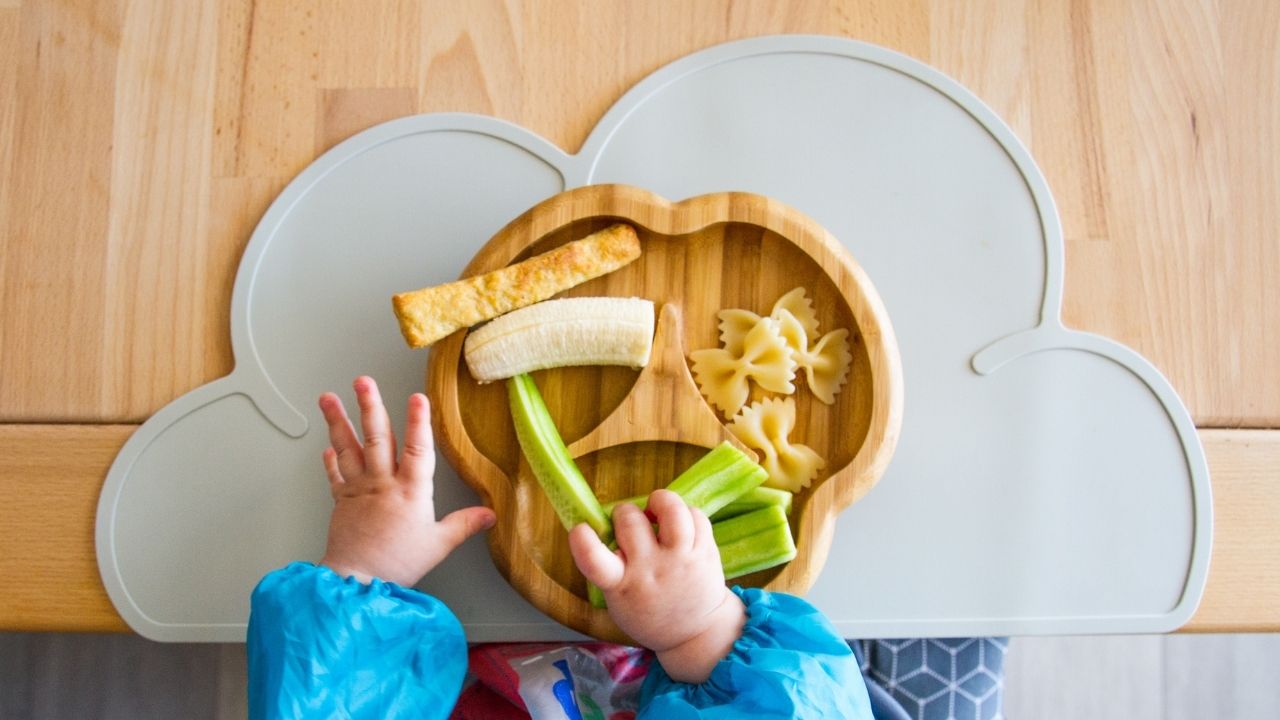As luck would have it, you and your partner both love cooking and trying new foods. So when your little one finally reaches the age of starting solid foods, you are excited to embark on a culinary journey together. But where do you even begin? How can you ensure that your baby is getting all the nutrients they need while also introducing them to new flavors and textures?
Well, fear not! With a bit of research and creativity, feeding your baby can become an adventure in healthy eating habits. Not only will this set them up for a lifetime of good nutrition, but it can also be a fun bonding experience for you and your little one. In this article, we'll explore the benefits of encouraging healthy eating habits from the start, as well as provide some creative recipes using fresh ingredients that will tantalize those tiny taste buds. So let's get started on our food adventures with baby!
Introducing Your Baby to Solid Foods
You'll want to start introducing your little one to solid foods in a gradual and gentle manner, ensuring that they are ready for this new stage of development. One option is baby-led weaning, where you offer soft, easy-to-grasp finger foods for your baby to explore on their own. This allows them to learn about different textures and tastes while developing their hand-eye coordination.
Another option is puree feeding, where you blend or mash fruits, vegetables, and proteins into a smooth consistency for your baby to eat. This method can be helpful if your baby has difficulty with the texture of solid foods at first or if you prefer more control over what they are eating. Whichever method you choose, it's important to introduce one food at a time and wait a few days before introducing something new to monitor for any potential allergic reactions.

Transitioning into the benefits of encouraging healthy eating habits, it's crucial to start early on in your child's life. By offering a variety of whole foods from all food groups and modeling healthy eating habits yourself, you can set the foundation for lifelong healthy food choices. Additionally, promoting positive mealtime experiences such as sitting down together as a family without distractions can also have long-lasting effects on your child's relationship with food.
The Benefits of Encouraging Healthy Eating Habits
When it comes to nutritional benefits, encouraging healthy eating habits can lead to a stronger immune system, better digestion, and improved energy levels. Additionally, introducing a variety of fruits and vegetables early on may decrease the likelihood of food allergies later in life. Developmentally, healthy eating habits can support brain development and cognitive function.
Establishing lifelong healthy habits is crucial for maintaining overall health and preventing chronic illnesses. By modeling healthy eating behaviors and involving children in meal planning and preparation, they are more likely to continue making nutritious choices into adulthood. Encouraging a positive relationship with food from an early age can also help prevent disordered eating patterns in the future.
Nutritional Benefits
The section on nutritional benefits is packed with valuable information that will help you make informed choices about what you put in your body. As a parent, it's important to understand the benefits of nutrient dense meals and superfoods for babies. Feeding your little one these types of foods can provide essential vitamins and minerals needed for growth and development. Some great examples of superfoods for babies include sweet potatoes, avocados, blueberries, and spinach. Incorporating these foods into your baby's diet can boost their immune system, support brain development, and improve digestion.

In addition to incorporating superfoods into your baby's meals, it's also important to offer healthy snack ideas and finger foods throughout the day. Snacks like sliced fruit or veggies with hummus dip are easy options that pack a nutritional punch. Finger foods like quinoa bites or homemade veggie nuggets not only provide nutrients but also help develop fine motor skills as your little one learns to pick up small pieces of food. By providing a variety of nutrient-dense meals and snacks throughout the day, you're setting your child up for a lifetime of healthy eating habits.
Developmental Benefits
As a parent, you can help support your child's cognitive and physical development by offering nutrient-dense meals and snacks that incorporate superfoods and finger foods. Brain development is particularly important during the first few years of life, and proper nutrition plays a key role in supporting this process. Foods rich in omega-3 fatty acids, such as salmon or chia seeds, can help support brain health and function. Additionally, incorporating colorful fruits and vegetables into your child's diet can provide essential vitamins and minerals for overall growth.
Taste preferences are also formed early on in childhood, making it important to offer a variety of flavors to your little one from the beginning. Introducing new foods slowly and consistently can help expand their palate over time. Offering different textures with finger foods like soft cooked veggies or sliced fruit can also contribute to healthy oral motor development. By prioritizing nutrition for your baby now, you are setting them up for lifelong healthy habits.
Establishing Lifelong Healthy Habits
Help your child develop a taste for nourishing meals early on to establish lifelong wellness practices. Encouraging healthy eating habits can lead to long term sustainability and prevent chronic diseases such as obesity, heart disease, and type 2 diabetes. Starting young also allows children to become more accepting of new flavors and textures, making them less picky eaters in the future.

Cultural influences may also play a role in your child's food preferences. Introducing a variety of cuisines from different cultures can broaden their palate and expand their understanding of different foods. It is important to expose your child to foods that are rich in nutrients such as fruits, vegetables, whole grains, lean proteins, and healthy fats. By doing so, you are setting them up for success in terms of nutrition and overall health. As we move onto the next section about creative and flavorful recipes for your baby, keep these key points in mind to ensure they have a well-rounded diet full of delicious options.
Creative and Flavorful Recipes for Your Baby
You'll find your taste buds dancing with joy as you explore these scrumptious and imaginative recipes, bursting with flavors that will tantalize even the pickiest little eaters. Say goodbye to boring purees and bland baby food, because there are plenty of delicious options available for introducing a variety of foods to your little one's diet. Whether you're following traditional puree methods or trying out baby-led weaning options, there are endless possibilities for creating tasty meals that both you and your baby can enjoy.
Here are four ideas to get you started on your culinary journey:
- Roasted sweet potato wedges - Cut sweet potatoes into wedges, toss in olive oil and seasonings of choice (such as cinnamon and nutmeg), then roast until tender.
- Avocado toast bites - Mash avocado onto whole grain bread slices and cut into bite-sized pieces for an easy snack or breakfast option.
- Lentil soup - Simmer lentils with vegetables like carrots, celery, and onions for a hearty soup that's packed with nutrients.
- Yogurt parfait - Layer plain Greek yogurt with fresh fruit (such as berries) and granola for a colorful treat that's also high in protein.
Using fresh and seasonal ingredients is key to creating flavorful dishes that also provide optimal nutrition for growing babies.

Using Fresh and Seasonal Ingredients
When it comes to using fresh and seasonal ingredients, there are a multitude of benefits that come with it. Not only do you get the best flavor, but fresh produce is also packed with nutrients that can help improve your health. To find seasonal ingredients, look for local farmer's markets or join a community-supported agriculture program (CSA). It's also important to consider choosing organic and locally sourced foods as they have been shown to have higher amounts of nutrients and lower levels of harmful chemicals.
Benefits of Fresh Produce
You can easily incorporate more fresh produce into your meals and reap the benefits of improved health and nutrition. Here are some reasons why you should prioritize fresh produce in your family's meals:
- Fresh produce is packed with vitamins, minerals, and antioxidants that support healthy growth and development.
- Eating a variety of fruits and vegetables ensures that your family gets a diverse range of nutrients that work together to promote optimal health.
- Incorporating fresh produce into your meals is an easy way to add flavor, color, and texture to your dishes while also reducing the need for added salt or sugar.
By prioritizing fresh produce in your family's meals, you are setting them up for success when it comes to developing healthy eating habits. In the next section, we will explore some tips for finding seasonal ingredients so that you can continue on this culinary journey towards better health.
Tips for Finding Seasonal Ingredients
Get ready to spice up your meals with seasonal ingredients that will add a burst of flavor and freshness to your dishes, making your taste buds dance with joy. One of the best ways to find seasonal ingredients is by visiting your local farmer's market. There, you can find an abundance of fresh produce that is in season and at its peak flavor. Not only does shopping at a farmer’s market support local farmers, but it also helps reduce the carbon footprint since the food doesn't have to travel far.

If you can't make it to a farmer's market, don't worry! There are plenty of online resources where you can order fresh produce that is in season. Websites like Farmbox Direct and Imperfect Foods deliver organic fruits and vegetables straight to your doorstep. When cooking with seasonal ingredients, be sure to experiment with different flavors and textures. Whether it's adding sliced peaches to your salad or roasting butternut squash for a warm winter soup, incorporating seasonal produce into your meals will elevate the taste while providing essential nutrients for both you and baby.
Importance of Organic and Local Foods
You'll be amazed at the difference in taste and quality when you choose to incorporate organic and locally sourced ingredients into your meals, supporting sustainable and ethical food practices. By purchasing from local farmers markets or joining a community-supported agriculture (CSA) program, you not only support small businesses in your area but also reduce the environmental impact of transporting food over long distances. Organic foods are grown without harmful pesticides and fertilizers, making them safer for both the environment and human consumption.
When considering cost comparison, it's important to note that although organic foods may seem more expensive than conventionally grown options, they often have higher nutrient levels due to their lack of chemicals and synthetic additives. Additionally, by choosing seasonal produce from local sources, you can save money while still enjoying fresh fruits and vegetables at their peak ripeness. As consumers become more conscious of their choices, we can all make a positive impact on our health and the environment by incorporating organic and locally sourced ingredients into our diets.
Making Mealtime Fun and Enjoyable for Your Baby
Making mealtime enjoyable for your baby involves more than just the food itself. Creative plating and presentation can make a big difference in how your little one perceives their meals. Engaging them in the cooking process, even if it's just stirring or adding ingredients, can also create positive associations with food. Lastly, implementing mealtime rituals and traditions, such as saying grace or trying new foods every week, can make mealtimes something to look forward to for both you and your baby.

Creative Plating and Presentation
With a little creativity and attention to detail, your dishes can transform from ordinary meals to visually stunning works of art that will leave your guests in awe. Plating techniques and serving suggestions can help you elevate the presentation of your dishes, making them more appealing to eat for both parents and babies alike. Here are some tips on how to make mealtime even more enjoyable:
- Use colorful ingredients: Brightly colored fruits and vegetables not only make your plate look more visually appealing but also provide essential nutrients for your baby's growth and development.
- Play with textures: Mix crunchy, chewy, soft, and smooth textures in one dish to add excitement to the mouthfeel. Babies love exploring different textures as they discover new foods.
- Use fun plates: Invest in cute or interesting plates that match the theme of the food or appeal to your baby's interests. For example, animal-shaped plates may capture their attention and encourage them to try new foods.
- Create a story on the plate: Arrange food items creatively by using shapes or patterns that tell a story on the plate. This technique allows you to engage with your baby while providing an opportunity for them to learn about different foods.
By incorporating creative plating techniques into mealtimes, you can create an enjoyable experience for both you and your baby. However, there's another way you can make mealtime memorable - engaging your baby in the cooking process!
Engaging Your Baby in the Cooking Process
Get your little one involved in the kitchen to not only create lasting memories but also instill important life skills and a love for cooking. Involving babies in cooking activities is a great way to encourage their curiosity about food and promote healthy habits. Even though they may be too young to help with complicated tasks, there are simple things that they can do such as washing fruits and vegetables or stirring ingredients. This will help them feel included in meal preparation and build their confidence.
Mealtime enjoyment is crucial for developing healthy eating habits. By engaging your baby in the cooking process, you're also creating an opportunity for them to learn more about different foods and flavors. Try involving them in selecting ingredients at the grocery store or farmers market, allowing them to touch and smell different produce items. By making meal preparation fun and interactive, you'll be setting the foundation for positive associations with food that will last a lifetime.

As you involve your baby more in the kitchen, it's important to establish mealtime rituals and traditions that make eating together a special time of day. From saying grace before meals to sharing stories around the dinner table, these small acts can create a sense of connection between family members while fostering healthy eating habits.
Mealtime Rituals and Traditions
By incorporating unique mealtime traditions and rituals, families can create a welcoming atmosphere that promotes togetherness and encourages gratitude for the nourishment provided. Mealtime traditions vary across cultures and regions, but they all share a common goal of bringing people together over food. For instance, some families have a designated 'family chef' who prepares meals while everyone else helps with setting the table or cleaning up afterward. Others say grace or express gratitude before eating to acknowledge their blessings.
Creating your own mealtime traditions can be as simple as choosing one day of the week where you cook together as a family or trying out new recipes from different cultural cuisines. For example, you could make tacos every Tuesday or explore Japanese cuisine by making sushi on Saturdays. By involving your baby in these rituals from an early age, they will begin to associate mealtime with positive emotions and look forward to spending time around the dinner table with loved ones.
As you navigate common challenges and concerns related to feeding your baby, it's important not to lose sight of the joy that comes from sharing meals together as a family. By creating meaningful mealtime rituals and traditions, you can reinforce healthy eating habits while also fostering deeper connections with those around you.

Navigating Common Challenges and Concerns
You may encounter various obstacles and worries while introducing new foods to your little one, but don't fret as we delve into strategies to overcome these challenges. One common concern is dealing with allergies or preferences. It's important to introduce a variety of foods from an early age, but always keep an eye out for any adverse reactions. If you suspect an allergy, consult with your pediatrician and consider getting your child tested. As for preferences, don't be discouraged if your baby doesn't take to certain foods right away. Keep offering them in different forms and combinations until they become more familiar.
Another challenge that parents often face is balancing nutrition and convenience. It can be tempting to rely on pre-packaged snacks or meals when you're short on time, but these options are often high in sugar and sodium. Instead, opt for fresh fruits and veggies that can be cut up ahead of time or make larger batches of homemade meals that can be frozen for later use. Remember, setting healthy habits starts at a young age so make the effort now to provide your baby with nutrient-dense foods whenever possible.
Frequently Asked Questions
What are some common food allergies to be aware of when introducing solid foods to a baby?
When introducing solid foods to your baby, it's important to be aware of common food allergens. These include milk, eggs, peanuts, tree nuts, soy, wheat, fish and shellfish. Signs of an allergic reaction can vary from mild symptoms such as hives or a rash to more severe symptoms like difficulty breathing or swelling of the face and throat. It's best to introduce one new food at a time and wait a few days before trying another. This way you can monitor for any signs of an allergic reaction. If you suspect your baby may have an allergy to a particular food, talk with your pediatrician about testing and safe alternatives. Remember that every baby is different and what works for one may not work for another - trust your instincts as a parent and prioritize your child's health above all else.
How can parents ensure their baby is receiving all necessary nutrients through their diet?
As you embark on the adventurous journey of baby led weaning, it's important to ensure that your little one is getting all the necessary nutrients from their meals. You want to provide nutrient dense meals that will fuel their growth and development. Incorporating a variety of colorful fruits and vegetables, whole grains, lean proteins, and healthy fats into their diet will help achieve this goal. Don't shy away from introducing new flavors and textures - babies are born curious! With thorough research and knowledge about nutrition, you can create a well-balanced meal plan that meets all of your baby's needs. Remember, feeding your little one isn't just nourishing their body - it's also an act of love.

Are there any foods that should be avoided in a baby's diet, even if they seem healthy?
When it comes to your baby's diet, it's important to maintain a nutritional balance while being aware of hidden dangers lurking in seemingly healthy foods. For example, honey should be avoided for the first year due to the risk of botulism. Additionally, some parents may think that fruit juice is a healthy option, but it can actually lead to tooth decay and obesity if consumed in excess. Another food to watch out for is popcorn - although it may seem harmless, the kernels can pose a choking hazard for young children. As you navigate your baby's food journey, remember to do thorough research and consult with a pediatrician before introducing new foods into their diet.
How can parents encourage their baby to try new foods and flavors?
Let's be real here: getting babies to try new foods can feel like an Olympic sport. But, fear not, intrepid parent! There are some tips and tricks you can use to encourage your little one to expand their palate. When it comes to spices, start small and work your way up. A pinch of cinnamon in oatmeal or a dash of turmeric in sweet potato puree can add flavor without overwhelming their developing taste buds. As for veggies, get creative! Puree them into sauces or mix them into mashed potatoes for added nutrition. And don't forget about finger foods like roasted carrots or steamed broccoli florets - they might just surprise you with how much they love them. With a little patience and persistence, your baby will be on their way to becoming a budding foodie in no time!
What should parents do if their baby refuses to eat certain foods or mealtimes become a battle?
Mealtime strategies are crucial for parents whose baby refuses to eat certain foods or mealtimes become a battle. It's important to understand that babies have different taste preferences and may need time to adjust to new flavors and textures. One effective strategy is offering alternative options such as pureed vegetables or fruits as a dip for finger foods. You can also try incorporating the rejected food into other dishes, like adding chopped veggies to pasta sauce or blending them into smoothies. Consistency is key, so keep introducing new foods in small amounts and don't force your baby to finish everything on their plate. Remember, mealtime should be an enjoyable experience for both you and your little one!
Conclusion
Congratulations on embarking on a culinary journey with your baby! By introducing healthy and flavorful foods early on, you are setting the foundation for lifelong healthy eating habits. According to studies, children who are exposed to a variety of fruits and vegetables from an early age are more likely to continue consuming them as they grow older.

It may take some patience and creativity, but experimenting with different ingredients and cooking methods can make mealtime enjoyable for both you and your little one. Remember to prioritize fresh and seasonal ingredients, as they provide optimal nutrition and flavor. With time, you'll find that your baby will develop their own unique palate and enjoy trying new foods. Keep up the good work in fostering a lifetime of healthy eating habits!
.png)





